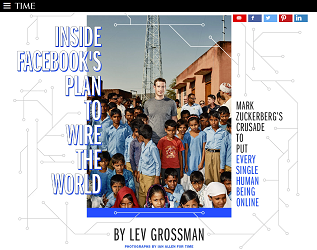Mark Zuckerberg’s “Benevolent” Goals
Contents
20.4. Mark Zuckerberg’s “Benevolent” Goals#
Let’s look more at Mark Zuckerberg and Meta as examples.

Fig. 20.2 Time Magazine article: Inside Facebook’s Plan to Wire the World, featuring a capitalist doing colonialism. This article is well worth reading.#
The subtitle of the above Time Magazine article is “Mark Zuckerberg is on a crusade to put every single human being online.” In it, Mark Zuckerberg outlines his humanitarian goal of trying to get every human on earth an Internet connection. Zuckerberg claims he is doing this for benevolent reasons and not selfish ones. The article quotes Sheryl Sandberg (Meta’s Chief Operating Officer) saying:
When we’ve been accused of doing this for our own profit, the joke we have is, God, if we were trying to maximize profits, we have a long list of ad products to build! We’d have to work our way pretty far down that list before we got to this.
We can see this too in Facebook’s 2017 mission statement: “Make the world more open and connected.”
20.4.1. Questioning Zuckerberg’s Plan#
Mark Zuckerberg here has put himself in the position of a “White Savior” who has come to fix the problems of people all over the world by giving them the Internet. But we can question whether his plan is a good one.
First: do users want the connection that Mark Zuckerberg is offering? The answer is at least in part yes, as people have signed up for the Internet through Zuckerberg’s program, and many are excited to access resources and be connected to the online world like everyone else.
Second: is connecting everyone a good thing? The answer to this is not necessarily yes. The 1979 comedic sci-Fi novel The Hitchhiker’s Guide to the Galaxy, mocks the idea of the good of connecting everyone:
[I]f you stick a Babel fish in your ear you can instantly understand anything said to you in any form of language. […] Meanwhile, the poor Babel fish, by effectively removing all barriers to communication between different races and cultures, has caused more and bloodier wars than anything else in the history of creation.
In fact, there are ways Zuckerberg’s plan has already gone poorly. Meta changed motto after “connecting the world” after problems with genocide and the January 6th insurrection). So Mark Zuckerberg posted an update:
I used to think that if we just gave people a voice and helped them connect, that would make the world better by itself. In many ways it has. But our society is still divided. Now I believe we have a responsibility to do even more. It’s not enough to simply connect the world, we must also work to bring the world closer together.
Meta now has a mission statement of “give people the power to build community and bring the world closer together.” But is this any better?
Again, you can read more about much of this in the Time Magazine article.
